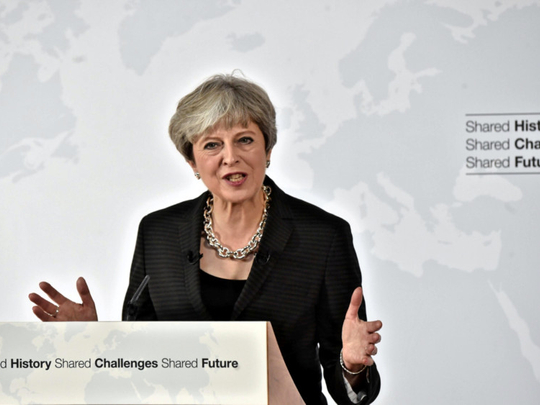
The fourth round of Brexit negotiations between the United Kingdom and EU begin today following Prime Minister Theresa May’s set-piece speech in Florence on Friday. In her Italian address, one of the most important of her premiership, it was clear that May is increasingly realising one of the great ironies of the UK’s vote to leave the EU last year.
That is, the monumental effort and time her government now needs to devote to the Brussels-based club for the foreseeable future, as it seeks to negotiate exit terms, is more so that perhaps all previous UK administrations did before the Brexit vote. Thus last year’s referendum that saw around 52 per cent of the population apparently voting for cutting ties with the EU is seeing the May team devote huge attention to Europe with a key strategic priority being developing a new relationship with the 27 other member-states.
Such is the scale of the task underway that it may be the most complex and important peacetime negotiation that the UK has ever faced. Part of the reason why the challenge is so big is that, as recent analysis from LSE IDEAS (the Centre for International Affairs, Diplomacy and Strategy) at the London School of Economics reveals, the Brexit vote triggered not one, but 14 overlapping negotiations to contend with (http://www.lse.ac.uk/ideas/research/updates/14-brexit). Collectively these comprise discussions centred within the UK; between the UK and the EU; within the EU; and also internationally beyond Europe; and are potentially very protracted.
More than a year into May’s premiership, even after her speech on Friday, the country remains little wiser about the likely pathway toward the EU exit door. This includes key details of what the alternative model she wishes the UK to adopt with the EU.
To much of the rest of Europe, Brexit Britain has therefore sometimes felt like one long comedy fast turning into farce, if not tragedy. To be fair to May, the scale of the challenge she faces isn’t all of her own making given that she inherited as prime minister no formal EU exit planning because her predecessor David Cameron refused to contemplate losing last year’s referendum.
However, her own government’s grasp of the realities of Brexit has been shaky from the start. Now Article 50 has been triggered and negotiations have formally begun, perhaps the key area of contention is what, if any, trade-offs can be agreed over the political need for May to be seen to secure curbs on free movement of people in potential exchange for diminished access to the European Single Market on which a significant array of British jobs and investment depend. Here, she is running head-on with those in the EU who are demanding that the four freedoms, including of people, must remain sacrosanct.
As May is fast discovering, the complexity of the negotiations that she must undertake now with no House of Commons majority means the government will find it hard to negotiate an alternative model that can secure consent from Brussels and the EU member-state, which comes close to providing the same balance of influence and advantages that the UK gets from its current full member status. For all the EU’s flaws, and it has many that need to be better tackled, the UK has enjoyed a uniquely positive position in what is the world’s largest political and economic union. For instance, it has all the benefits of the single market, but is not part of the Eurozone, and it has retained a big budgetary rebate.
The stark reality is that, while the nature of existing agreements with the EU vary from Norway to Switzerland and Canada and Turkey, all have key disadvantages, including the fact that none of them provide full access to services which accounts for around 80 per cent of the UK economy. Moreover, Brexiteers continue to generally shy away from the implications of what even access to (let alone membership of) the single market may entail without EU membership.
Take the example of Norway which has considerable access to the single market, except in areas like agriculture and fisheries. In exchange, it is required to adhere to EU rules without having a vote on them as EU member such as the UK does now; it accepts free movement of people; makes contributions to EU programmes and budgets; and still is required to do customs checks on goods crossing into the EU.
Moreover, preferential access to 53 markets outside Europe with which the EU has free trade agreements will come to an end with Brexit, or need to be eventually renegotiated bilaterally in coming years. And outside of the economic realm, May knows — as a former UK home secretary — that forthcoming discussion offer no guarantees that the UK could fully replicate existing cooperation in areas like policing and security which she has previously cited as important.
Taken overall, the realisation is spreading within the UK government that more of its resource and attention need to be directed towards the EU in coming years than its predecessors. This irony is compounded by the fact that, despite all of this effort, May will struggle to strike a deal that is better for the UK national interest than one in which continued membership of a reformed EU potentially offers.
Andrew Hammond is an Associate at LSE IDEAS at the London School of Economics.









